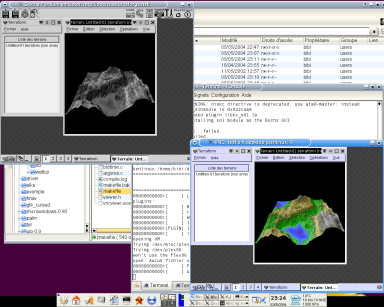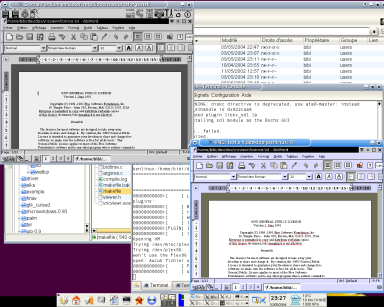VncViewer for 8086
Description
The aim of this project is to provide a VNC viewer with very small hardware requirements, making it usable on a 8086 PC.
The source code is greatly based on the source code of Xvncviewer 3.3, the official VNC viewer for Unix.
Why ?
Because there's a lot of 8086/286/386 PC sitting around, taking the dust because all their software & hardware are obsolete.
Because today's computers are so powerful that there's enough power for more than only one user.
So, with a soft like VncViewer8086, you can turn your old computer into a full fledge desktop beast, allowing it to display and use a full KDE/Gnome/XP/MaxOSX/whatever desktop, just by connecting it to a more powerful computer.
Status
Only tested on a 286 with 1 MB of RAM.
Communication with the server working.
Basic Mouse support (only left button).
Basic Keyboard support (only keys that have a ASCII code).
Display remote screen in 640x480x16 (grey levels) VGA in RAW, Hextile and CopyRect encoding. In fact, only hextile is enabled, as it's the fastest one...
News
2004-14-05 The first alpha release with partial mouse and keyboard support ! The source code is available from CVS
2004-05-04 Another new pre-alpha release with a fully working hextile encoding (much faster than raw encoding !)
2004-04-23 A new pre-alpha version providing a 16 grey levels palette which nicely matches the brightness of the pixels sent by the VNC server.
2004-04-22 A pre-alpha-techno-demo-proof-of-concept version is available in the Downloads section.
ToDo
Priority 0
Full support for mouse (including mouse wheel).
Full support for keyboard.
Priority 1
Full VGA/EGA/CGA support with modular architecture to easily add other video mode (Hercules, SVGA, etc...).
Priority 2
Support for ZRLE and TightVNC Encoding.
Support for VNC 4.
Screenshots
The grey levels in actions (click to enlarge)

Same thing with an AbiWord window (click to enlarge)

Downloads
There is 3 files in the binary zip file. They need to be together in the same directory:
tcp.cfg contains the IP address and the net mask for the network card you want to use on the client
vncviewr.exe is the viewer. It takes one argument: the name or IP address of the host, with the number of the screen you want to connect (for example: 192.168.1.1:0)
egavga.bgi is the EGA/VGA driver from Borland Turbo C.
Binary
Sources
Requirements
Hardware
PC compatible computer with a 8086 or higher processor
512 KB RAM (VNC Viewer 8086 won't use that much but you need it for the operating system)
graphical capable video card (CGA, EGA, VGA)
floppy drive (the targeted size of the executable is 120KB) or hard disk
a network card is highly recommended but you can use the serial or parallel port to communicate with the server if you have a packet driver for SLIP ou PLIP.
a keyboard can be useful but is not necessary if you don't need to input anything (using the viewer as just a "viewer")
a mouse (with wheel) could be nice but it's optional
Software
a DOS compatible operating system (MS-DOS, DR-DOS, etc...). I use FreeDOS which is a libre software.
a packet driver
a mouse driver if you use a mouse (I suggest you the really efficient CuteMouse driver)
Feedback & Support
If you find this software useful, or if you need help getting it to work, or if anything else, you can put a message in the forum.
Development
All the developments take place on a Linux workstation (Debian Sid).
VncViewer8086 compiles with Borland Turbo C version 2.01. You can get it for free at Borland Museum. I use Dosemu to make Turbo C working on my Linux.
It uses Wattcp for the TCP/IP communication.
(I use Bochs during the development to test the viewer.)
Freely hosted by



